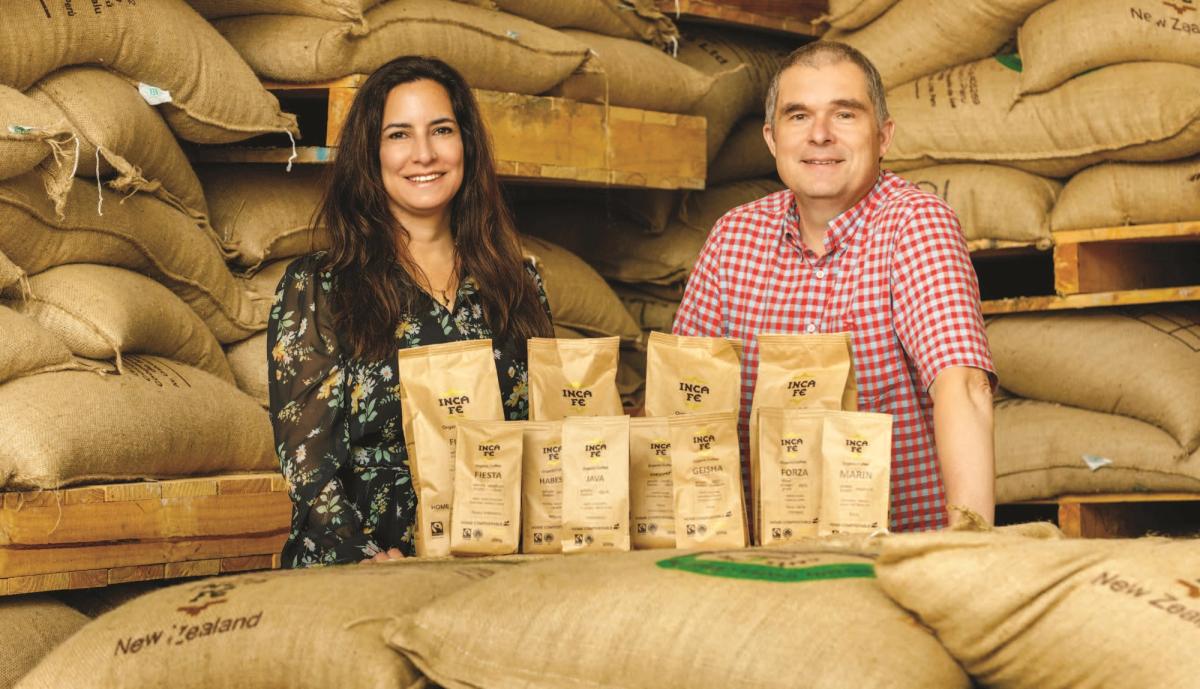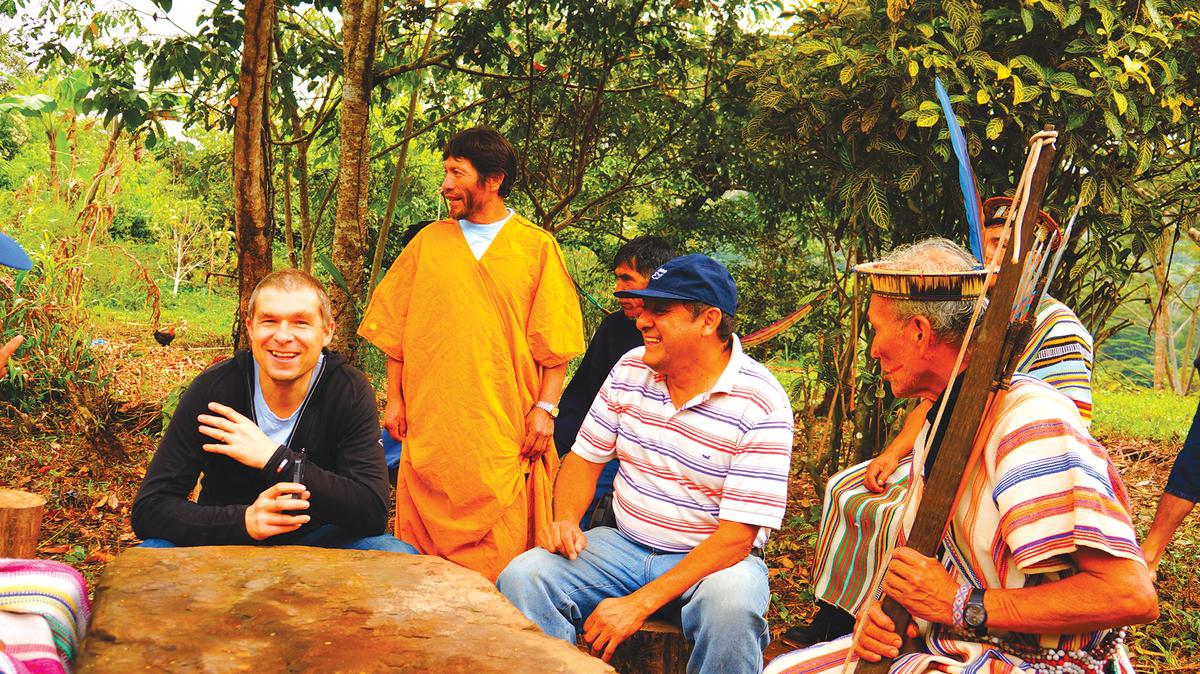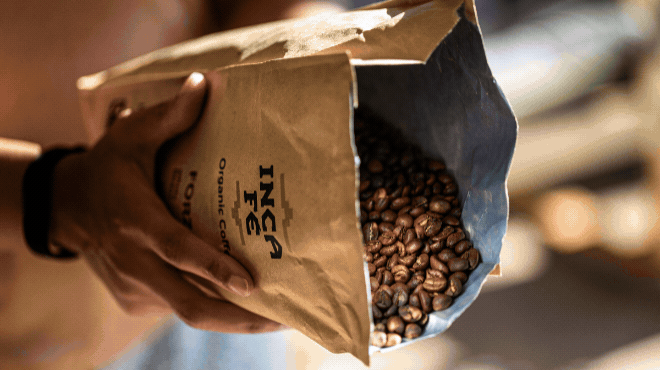
Incafé owners and founders Carmen Castro and Joop Verbeek. Source: Incafé
Member name: Incafé
Toitū certification: net carbonzero organisation
Years on programme: 15 years
Nestled on the western coast of North Island in New Plymouth is a small business with big sustainability values. IncaFé Organic Coffee is the creation of Joop Verbeek and Carmen Castro, a friendly couple with an intriguing background. Joop hails from the Netherlands and previously worked for one of the largest oil companies in the world. Carmen is an architect from Peru.
They have personally seen the destruction of rainforests, lowlands, and waterways. They saw coffee as a different opportunity, being an agricultural product that could be grown directly amongst trees (and thrives by it too), a good example of agroforestry.
Plunge into our interview with them below on how IncaFé has grown and be inspired by their determination to protect our planet’s biodiversity.
Tell me a bit about your background… where did your passion in sustainability come from?
Joop: I’m originally Dutch and grew up in agriculture, as a child. It was intensive, so I saw a lot of spraying. We used a lot of poison in the 70s and 80s. We can only speculate abouts its impact on people however we saw a big impact on the environment because the poisons drained into the canals very quickly. It was very evident on the aqueous life. I quickly understood this was not right.
Interesting enough, I did work for a large oil company. At that time, climate change was not so much an issue. Actually, we were “the good guys” because we were converting people from coal to gas. It was an exciting time, especially for engineers like myself.
My first posting was in Borneo in 1991, and later to Peru. Both of those had a big impact on me. Seeing firsthand the destruction of the rainforest in Borneo was terrible. It was purely the huge profits traders could get for specialty woods and the icing on the pudding was bulk wood for construction, paper, and manufacturing. It was a land grab to start palm oil plantations, which at that time was just the excuse governments used, so called “land development”, as there was no market for palm oil, that came only years later. The clear-felling of possibly the most unique rainforest in the world was an ecological disaster. The native people didn’t get anything and lost their habitat and way of life.

Joop and Yaneshe tribe in Peruvian Amazon. Source: Incafé
How long have you both been interested in coffee?
Joop: Being Dutch, I've been drinking coffee , since I was 3-4 years old. And I really like it! So, whilst in Peru it was a brother-in-law of Carmen that took me to an area where he grew up and his father had a coffee plantation. I realised it’s a great product because you can grow it amongst trees, so you can have a really nice symbiosis.
We are convinced organic coffee tastes better and it is chemical free, but most of its impact is on the environment. You cannot have organic coffee without trees - you need them to stop erosion and for nutrients, shade, and the birds and insects. Organic coffee plantations sequester significant amounts of carbon.
With my passion for organics and coffee to see a product that can be grown like that, it is brilliant. In my view all coffee should be grown with shade cover, organic or not.
We want to have the most sustainable coffee in the market and with it being organic, it was a logical thing to become Toitū net carbonzero certified. So, we did it all at once when we started the company.
So, this was back in 2008 when you got involved in Toitū and certification?
Carmen: Right, so we set up our business at the end of 2006, then started producing and selling coffee in 2007. There were a few things to get through. Organic was first, then Fairtrade, then Toitū carbon zero. It was all happening early on.
How did engaging with Toitū change the way that you work?
Carmen: It helps you to be aware of your emissions, the way you process, your procedures in the roasting plant. It has made us for example review electricity use and review electricity providers.
Yes, I saw you get your electricity from Ecotricity and your waste is with Waste Management. Who are both Toitū members. So, that was a conscious decision?
Carmen: Completely, yes. We’ve changed electricity providers a few times, but once we found Ecotricity that was it. We decided to stay with them. I mean, power is power no matter what company you get it from, but if you get it from a company that’s climate positive certified that’s better.
We partner with companies that have the same ambition. It would be so great if all companies in NZ were carbon zero so that we are all on the same page with that.
Joop: We book the most direct route for the coffee, which tends to be quite a bit more expensive. We do it because it means we have less emissions but it also allows to have less stock held here in NZ and reduces the risk of the quality being affected in transit. These efficiencies go hand in hand.
So, it’s about little things like that. Becoming more efficient. Per tonne of coffee roasted/sold our emissions are by international standards very low.
Carmen: Warming up the roaster takes quite a long time. So, instead of warming it up the following day, if you roast for longer periods you don’t have to warm it up again. But you maximise the energy you are using.

Rolling images of Incafé beans, Joop by a roasting machine, an organic coffee plantation, and Joop inspecting beans. Source: Incafé
Do you see any challenges, or new innovations, that are coming up?
Joop: The biggest emissions in the supply chain of coffee are normally on the farm but we mitigate them by only selecting organic growers. The biggest emissions under our direct remit are that from roasting. For years we have been looking at eliminating gas use for roasting but new technology is only now emerging. It is early days, but we are convinced that in the next 5 years we will see a major change in roasting technology. We will pursue it vigorously.
Do you find that your staff understand your work?
Joop: When you recruit you cannot impose your values on your staff. But all our staff are sympathetic to our efforts to be sustainable, and some are really living it as well. Their focus is mostly on making the best product possible, they understand my drive for efficiency and most of all they do get the big picture. We start the day with coffee and sometimes we are quite happy to chat for an hour about work and all sorts of stuff. It is all part of being in business I think, we need to look after our staff, make them feel at home, our suppliers, our clients and the environment and then try to make some profit. Our staff understands that I think.
Carmen: I do believe that the whole sustainability culture, is filtering through to the staff, and they do understand that it is the core of our business. It’s about producing good coffee, but in a sustainable way. We don’t micromanage and our staff have quite a bit of ownership.
For instance, we were sending Christmas presents to our staff and somebody came up with the idea of wrapping it in cellophane and putting ribbons, but it was a team decision that we don’t do that because it’s not sustainable. Even though it looks nice and it’s not “a big deal”, it was a big deal… every little choice that you make, as insignificant as it may appear, is a decision to be sustainable or not. We are nowhere perfect but we continuously improve.
What would you say to other businesses that were just starting their carbon reduction journey now?
Carmen: It’s not as difficult as most people think. People think it will be an expensive exercise to become Toitū net carbonzero certified, but it’s the opposite. It’s cost-efficient as it raises awareness of the true costs of certain activities that then possibly could be done otherwise.